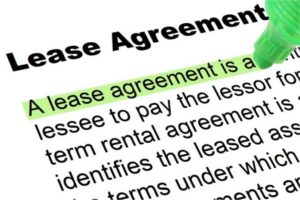Even if you think you have an understanding of the terms used during the transaction, it is a good idea to double check the real estate glossary below.
 Absorption Rate – An estimate of the rate at which a particular classification of space – such as new office space, new housing, new condominium units and the like – will be sold or occupied each year.
Absorption Rate – An estimate of the rate at which a particular classification of space – such as new office space, new housing, new condominium units and the like – will be sold or occupied each year.- Abstract of Title – A concise, summarized history of the title to a specific parcel of real property, together with a statement of all liens and encumbrances affecting the property. The abstract of title does not guarantee or assure the validity of the title of the property. It merely discloses those items about the property which are of public record, and thus does not reveal such things as encroachments, forgeries, and the like.
- Acceleration Clause – A clause in a promissory note, agreement of sale, or mortgage which gives the lender the right to call all sums due and payable in advance of the fixed payment date upon the occurrence of a specified event, such as a sale, default, assignment or further encumbrance of the property.
- Accrued – That which has accumulated over a period of time such as accrued depreciation, accrued interest or accrued expenses.
- Adjustable Rate Mortgage (ARM). A mortgage with an interest rate that changes over time in line with movements in the index. ARMs are also referred to as AMLs (adjustable mortgage loans) or VRMs (variable rate mortgages).
- Adjustment Period. The length of time between interest rate changes on an ARM. For example, a loan with an adjustment period of one year is called a one year ARM, which means that the interest rate can change once a year.
- Alienation Clause – A clause in a promissory note or mortgage which provides that the balance of the secured debt becomes immediately due and payable at the option of the mortgagee upon the alienation of the property by the mortgagor.
- Amortization. Repayment of a loan in installments of principal and interest, rather than interest-only payments, where at the end of the period leaves a zero balance.
- Annual Percentage Rate (APR). The total finance charge (interest, loan fees, points) expressed as a percentage of the loan amount.
- Appraisal. An estimate of the property’s value.
- Appreciation – An increase in the worth or value of property due to economic or related causes, which may prove to be either temporary or permanent.
- Arbitration – The non-judicial submission of a controversy to selected third parties for their determination in the manner provided by agreement or by law.
- Assumption of Mortgage. A buyer’s agreement to assume the liability under an existing note that is secured by a mortgage or deed of trust. The lender must approve the buyer in order to release the original borrower (usually the seller) from liability.
-
 Balloon Payment. A lump sum principal payment due at the end of some mortgages or other long term loans.
Balloon Payment. A lump sum principal payment due at the end of some mortgages or other long term loans. - Basis – The financial interest which IRS attributes to the owner of an asset for purposes of determining annual depreciation and gain or loss on sale of the asset.
- Binder. Sometimes known as an offer to purchase or an earnest money receipt. A binder is the acknowledgment of a deposit along with a brief written agreement to enter into a contract for the sale of real estate.
- Blanket Mortgage – A mortgage which is secured by several structures or a number of lots. A blanket mortgage is often used to finance proposed subdivisions or development projects, especially cooperatives.
- Boot – Money or other property given to make up any difference in value or equity between two exchanged properties.
- Buydown. Permanent-prepaid interest that brings the note rate on the loan down to a lower, permanent rate. Temporary-prepaid interest that lowers the note rate temporarily on the loan, allowing the buyer to more readily qualify and to increase payments as income grows.
- Cap. The limit on how much an interest rate or monthly payment can change, either at each adjustment or over the life of the mortgage.
- Capital Gain – The taxable profit derived from the sale of a capital asset.
- Capitalization Rate. A method of measuring investments that takes into account the variable operating expenses and periodic vacancy. It ignores factors such as appreciation, financing variables, leverage, tax impact and proceeds from the sale.
- Cash Flow. The income on an investment property. With a negative cash flow the expenses would be more than the income. A positive cash flow would be the opposite, with more income than expenses. Money in the bank!
- Cash Reserves. The amount of the buyers liquid cash remaining after making the down payment and paying all closing costs.
- CC&Rs. Covenants, conditions and restrictions. A document that controls the use, requirements and restrictions of a property.
- Certificate of Commitment. The lender’s approval of a VA loan, which is usually good for up to six months.
- Certificate of Reasonable Value (CRV). A document that establishes the maximum value and loan amount for a VA guaranteed mortgage.
- Chattel. Personal property.
- Clear Title – Title to property that is free from liens, defects or other encumbrances, except those which the buyer has agreed to accept, such as mortgage to be assumed, the ground lease of record, and the like; established title; title without clouds.
- Closing – The final stage of consummating a real estate transaction when the seller delivers title to the buyer, in exchange for the purchase price.
- Closing costs – Expenses of the sale which must be paid in addition to the purchase price (in the case of the buyer’s expenses), or be deducted from the proceeds of the sale (in the case of the seller’s expenses).
- Closing Statement. The financial disclosure statement that accounts for all of the funds received and expected at the closing, including deposits for taxes, hazard insurance and mortgage insurance.
- Cloud on Title – Any document, claim, unreleased lien or encumbrance which many impair or injure the title to property or make the title doubtful because of its apparent or possible validity.
- Color of Title – A condition which has the appearance of good title, but which in fact is not valid title, as where title is founded on some written document which on its face appears valid and effective, but which is actually invalid.
- Commitment Period. The period during which a loan approval is valid.
- Compound Interest – Interest which is computed upon the principal sum plus accrued interest.
- Condominium. A form of real estate ownership where the owner receives title to a particular unit and has a proportionate interest in certain common areas. The unit itself is generally a separately owned space whose interior surface (walls, floors and ceilings) serve as its boundaries.
- Contingency. A condition that must be satisfied before a contract is binding. For instance, a sales agreement may be contingent upon the buyer obtaining financing.
- Conversion Clause. A provision in some ARMs that enables home buyers to change an ARM to a fixed rate loan, usually after the first adjustment period. The new fixed rate is generally set at the prevailing interest rate for fixed rate mortgages. This conversion feature may cost extra.
- Conveyance – The transfer of title to real property by means of a written instrument such as a deed or an assignment of lease.
- Cooperative. A form of multiple ownership in which a corporation or business trust intity holds title to a property and grants occupancy rights to shareholders by means of proprietary leases or similar arrangements.
- Counter Offer – A new offer made as a reply to an offer received from another; this has the effect of rejecting the original offer, which cannot thereafter be accepted unless revived by the offeror’s repeating it.
- Covenant – A written agreement or promise of two or more parties by which either pledges to perform or not to perform specified acts on a property, or which specifies certain uses or non-uses of the property.
- Covenants and Conditions – Covenants are promises contained in contracts, the breach of which would entitle a person to damages. Conditions, on the other hand, are contingencies, qualifications or occurrences upon which an estate or property right would be gained or lost.
 Debt Ratios. The comparison of a buyer’s housing costs to his or her gross or net effective income, and the comparison of a buyer’s total long-term debt to his or her gross or net effective income. The first ratio is housing ratio; the second ratio is total debt ratio.
Debt Ratios. The comparison of a buyer’s housing costs to his or her gross or net effective income, and the comparison of a buyer’s total long-term debt to his or her gross or net effective income. The first ratio is housing ratio; the second ratio is total debt ratio.- Debt Service. The Principal & Interest portions of your mortgage payment.
- Deed of Trust – A legal document in which title to property is transferred to a third party trustee as security for an obligation owed by the trustor (borrower) to the beneficiary(lender).
- Default – Failure to fulfill a duty or promise or failure to perform any obligation or required act. The most common occurrence of default on the part of a buyer or lessee is non-payment of money.
- Deficiency Judgement – A judgment against a borrower, endorser, or guarantor for the balance of the debt issued when the security for a loan is insufficient to satisfy the debt.
- Density – A term, frequently used in connection with zoning requirements, which means the maximum number of building units per acre or the number of occupants or families per unit of land area (acre, square mile, etc.); usually the ratio of land area to improvement area.
- Depreciation (Appraisal) – A loss in value due to any cause; any condition which adversely affects the value of an improvement.
- Depreciation (Tax) – For tax purposes, depreciation is an expense deduction taken for an investment in depreciable property.
- Discount Points – An added loan fee charged by a lender to make the yield on a lower-than-market interest VA or FHA loan competitive with higher interest conventional loans.
- Due-On-Sale Clause. A clause that requires a full payment of a mortgage or deed of trust when the secured property changes ownership.
- Earnest Money. The portion of the down payment delivered to the seller or escrow agent by the purchaser with a written offer as evidence of good faith.
- Easement – A property interest which one person has in land owned by another entitling the holder of the interest to limited use or enjoyment of the other’s land.
- Easement in Gross – The limited right of one person to use another’s land (servient estate), which right is not created for the benefit of any land owned by the owner of the easement; that is, there is no dominant estate, as the easement attaches personally to the owner, not to the land.
- Encumbrance – Any claim, lien, charge or liability attached to and binding upon real property which may lessen the value of the property but will not necessarily prevent transfer of title.
- Equity. The difference between what is owed and what the property could be sold for.
- Escrow. A procedure in which a thrid party acts as a stakeholder for both the buyer and the seller, carrying out both parties’ instructions and assuming responsibility for handling all of the paperwork and distribution of funds.
- Exchange – A transaction in which all or part of the consideration for the purchase of real property is the transfer of property of a like kind.
- FHA Loan. A loan insured by the Federal Housing Administration (of the Department of Housing and Urban Development).
- Federal Home Loan Mortgage Corporation (FHLMC). Called “Freddie Mac”; a part of the secondary market, particularly used to purchase loans from savings and loan lenders with the Federal Home Loan Bank Board.
- Federal National Mortgage Association (FNMA). Popularly known as “Fannie Mae.” A privately owned corporation created by Congress to support the secondary mortgage market. It purchases and sells residential mortagages insured by FHA or guaranteed by the VA, as well as conventional home mortgages.
- Fee Simple. An estate in which the owner has unrestricted power to dispose of the property as he wishes including leaving by will or inheritance. It is the greatest interest a person can have in real estate.
- Finance Charge. The total cost a borrower must pay, directly or indirectly, to obtain credit according to Regulation Z.
- Fixed Rate Mortgage. A conventional loan with a single interest rate for the life of the loan.
- Fully Indexed Rate. The maximum interest rate on an ARM that can be reached at the first adjustment.
 Gift Letter. A letter from a relative stating that an amount will be gifted to the buyer, and that said amount is not to be repaid.
Gift Letter. A letter from a relative stating that an amount will be gifted to the buyer, and that said amount is not to be repaid.- Government National Mortgage Association (GNMA). Called “Ginnie Mae.” A governmental part of the secondary market that deals primarily in recycling VA and FHA mortgages, particularly those that are highly leveraged.
- Graduated Payment Mortgage. A residential mortgage with monthly payments that start at a low level and increase at a predetermined rate.
- Gross Income Multiplier (GIM). This is the sales price divided by the annual rents.
- Gross Rent Multiplier (GRM). This is the sales price divided by the monthly contract rental rate.
- Home Warranty Plan. Protection against failure of mechanical systems within the property. Usually includes plumbing, electrical, heating systems and installed appliances.
- Index. A measure of interest rate changes used to determine changes in an ARM’s interest rate ovoer the term of the loan.
- Initial Interest Rate. The introductory interest rate on a loan; signals that there may be rate adjustments later in the loan.
- Internal Rate of Return (IRR). This is the discount rate that equates the present value of cash inflows with cash outflows. The interest percentage on a loan is an IRR.
- Joint Tenancy. An equal undivided ownership of property by two or more persons. Upon the death of any owner, the survivors take the decendent’s interest int he property.
- Judgment Lien – A lien binding on all the real estate of a judgment-debtor and giving the holder of the judgment a right to levy (i.e. to seize) the land for satisfaction of the judgment.
- Jumbo Loans. Mortgage loans that exceed the loan amounts acceptable for sale in the secondary market; these jumbos must be packaged and sold differently to investors and therefore have separate underwriting guidelines.
 Leverage. Use of borrowed funds to finance a portion of the acquisition of an investment.
Leverage. Use of borrowed funds to finance a portion of the acquisition of an investment.- Lien. A legal hold or claim on property as security for a debt or charge.
- Liquidated Damages – An amount predetermined by the parties to an agreement as the total amount of compensation an injured party should receive in the event the other party breaches a specified part of the contract.
- Loan Commitment. A written promise to make a loan for a specified amount on specified terms.
- Loan-To-Value-Ratio. The relationship between the amount of the mortgage and the appraised value fo the property, expressed a s a percentage of the appraised value.
- Lock-in. The fixing of an interst rate or points at a certain level, usually during the loan application process. It is usually dnoe for a certain period of time, such as 60 days, and may require a fee or premium in the form of a higher interest rate.
- Margin. The number of percentage points the lender adds to the index rate to calculate the ARM interest rate at each adjustment.
- Mortgage Insurance Premium (MIP). The mortgage insurance required on FHA loans for the life of said loans; MIP can either be paid in cash at closing or financed in its entirety in the loan. The premium varies depending on the method of payment.
- Mortgage Life Insurance. A type of term life insurance often bought by home buyers. The coverage decreases as the mortgage balance declines. If the borrower dies while the policy is in force, the mortgage debt is automatically covered by insurance proceeds.
- Negative Amortization. Occurs when monthly payments fail to cover the interest cost. The interest that isn’t covered is added to the unpaid principal balance, which means that even after several payments the borrowers could owe more that they did at the beginning of the loan. Negative ammortization can occur when an ARM has a payment cap that results in monthly payments that aren’t high enough to cover interest.
- Net Income – The sum arrived at after deducting from gross income the expenses of a business or investment, including taxes and insurance, and allowances for vacancy and bad debts; what the property will earn in a given year’s operation.
- Net Lease – A lease, usually commercial, whereby the lessee pays not only the rent for occupancy, but also pays maintenance and operating expenses such as tax, insurance, utilities and repairs. Thus the rent paid is “net” to the lessor.
- Net Worth – The value remaining after deducting liabilities from assets.
- Origination Fee. A fee or charge for work involved in evaluation, preparing and submitting a proposed mortgage loan. The fee is limited to 1% for FHA and VA loans.
- Package Mortgage – A method of financing in which the loan that finances the purchase of a home also finances the purchase of personal items such as a washer and dryer, refrigerator, stove and other specified appliances.
- Participation Mortgage – A mortgage in which the lender participates in the income of the mortgaged venture beyond a fixed return, or receives a yield on the loan in addition to the straight interest rate.
- Party Wall – A wall which is located on or at a boundary line between two adjoining parcels and is used or is intended to be used by the owners of both properties in the construction or maintenance of improvements on their respective lots.
- Payment Cap. The maximum amount the payment can adjust in any given time frame.
- Percolation Test – A hydraulic engineer’s test of soil to determine the ability of the ground to absorb and drain water.
- PITI. Principal, Interest, Taxes and Insurance.
- Planned Unit Development (PUD). A zoning designation for property developed at the same or slightly greater overall density than conventional development, sometimes with improvements clustered between open, common areas. Use may be residential, commercial or industrial.
- Point. An amount equeal to one percent of the principal amount of the investment or note. Lender assesses loan discount points at closing to increase the yield on the mortgage to a position competitive with other types of investments.
- Prepayment Penalty. A fee charged to a borrower who pays a loan before it is due. Not allowed for FHA or VA loans.
- Prime Rate – The minimum interest rate charged by a commercial bank on short-term loans to its largest and strongest clients(those with the highest credit standings).
- Private Mortgage Insurance (PMI). Insurance written by a private company protecting the lender against loss if the borrower defaults on the mortgage.
- Purchase Agreement. A written document in which the purchaser agrees to buy certain real estate and the seller agrees to sell under stated terms and conditions. Also called a sales contract, earnest money contract, or agreement for sale.
- Rate of Return – The relationship (expressed as a percentage)between the annual net income generated by a business and the invested capital, or the appraised value, or the gross income, etc., of the business.
- Rate Gap. The difference between where the rate is now and where it could adjust to on an ARM. Also used to compare the difference between a current conventional rate and that of an ARM.
- Realtor. A real estate broker or associate active in a local real estate board affiliated with the National Association of Realtors.
- Regulation Z. The set of rules governing consumer lending issued by the Federal Reserve Board of Governors in accordance wtih the Consumer Protection Act.
- Right of Survivorship – The distinctive characteristic of a joint tenancy (also tenancy by entirety) by which the surviving joint tenant(s) succeeds to all right, title and interest of the deceased joint tenant without the need for probate proceedings.
- Second Mortgage – A mortgage which is junior or subordinate to a first mortgage; typically, an additional loan imposed on top of the first mortgage, which is taken out when the borrower needs more money.
- Secondary Mortgage Market – A market for the purchase and sale of existing mortgages, designed to provide greater liquidity for mortgages; also called secondary money market.
- Specific Performance – A legal action brought in a court of equity to compel a party to carry out the terms of a contract.
- Tenancy in Common. A type of joint ownership of property by two or more persons with no right of survivorship.
- Title Insurance Policy. A policy that protects the purchaser, mrotgagee or other party against losses.
- Title Search – An examination of the public records to determine what, if any, defects there are in the chain of title.
- Total Yield. Consists of both a return of the capital invested plus a return on the capital invested during the holding period.
- Trade Fixtures – Articles of personal property annexed to leased premises by the tenant, as a necessary part of the tenant’s trade or business.
- Triple Net Lease – A net, net, net lease, where in addition to the stipulated rent, the lessee assumes payment of all expenses associated with the operation of the property.
- VA Loans. A loan, made by a private lender, that is partially guaranteed by the Veterans Adminstration.
- Vacancy Factor – An allowance or discount for estimated vacancies(unrented units) in a rental project. The vacancy rate is the ratio between the number of vacant units and the total number of units in a specified project or area.
- Yield – The return on an investment or the amount of profit, stated as a percentage of the amount invested.

